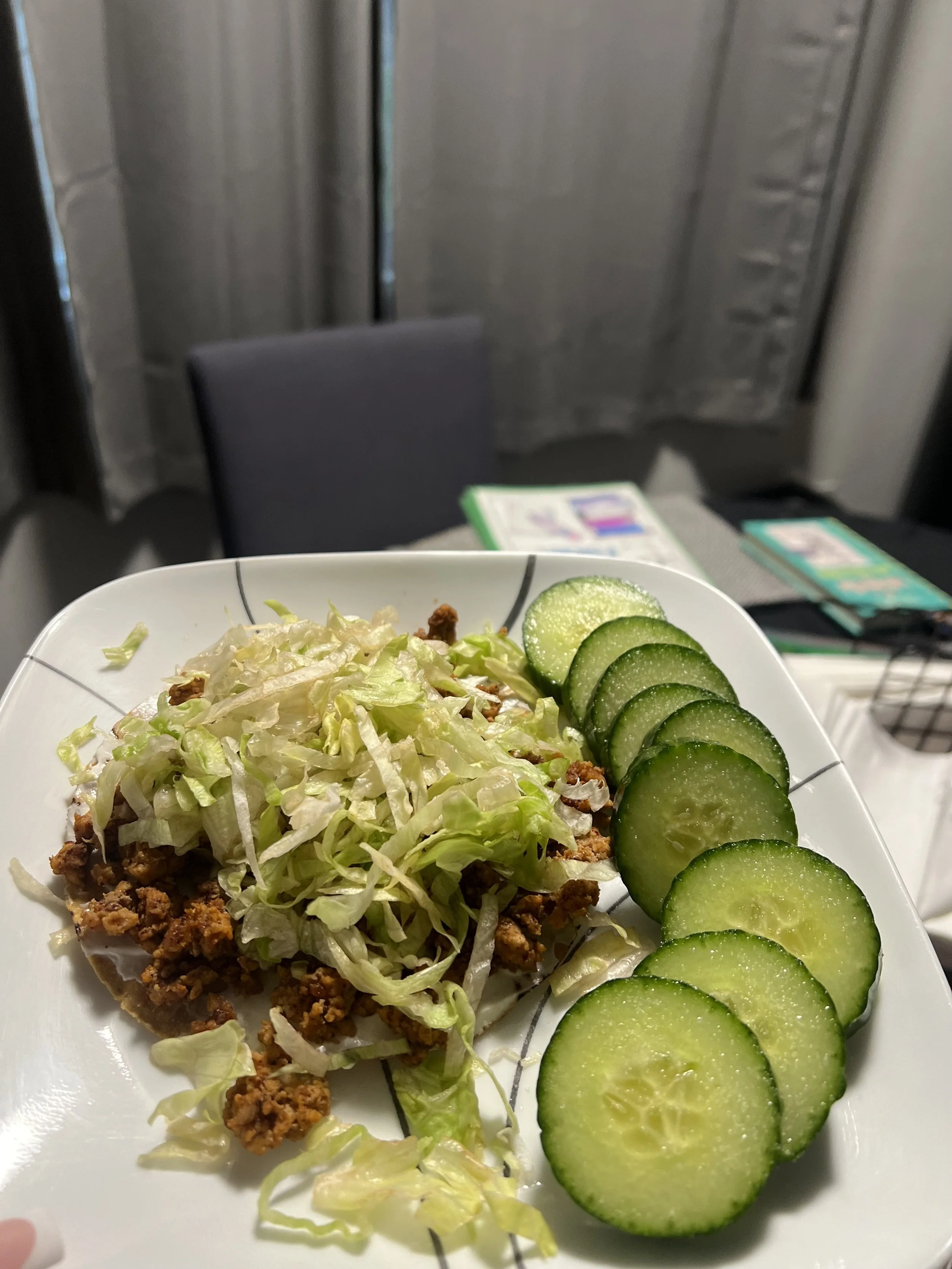Cooking: Why is it Essential?
By Lionel Getten
graphic by Lionel Getten
“Life itself is the proper binge,” famously uttered by none other than Julia Child. Producer of award-winning cookbooks and television series (while being the first woman to do so), Child began her journey just like the rest of us, an avid eater reluctant to cook. Her story details how anyone can learn how to cook, but the one I am here to tell is why everyone should.
As college students, the burden of 11:59 p.m. submission deadlines and mid-term exams weigh on us so much that we disregard other essential life skills. While popping Cup Noodles in the microwave for every meal may be convenient for the time being, maintaining one’s health requires that individuals seek nutrition from every food group. How to obtain these nutrients is completely up to you, but with a more hands-on approach, you have more control over what exactly goes inside of your body.
“The only real stumbling block is fear of failure. In cooking, you’ve got to have a what-the-hell attitude.”
Aside from lack of time, preventing many college students from getting in the kitchen is the anxiety that comes along with cooking. A poll organized on my Instagram, @llionel.getten_ revealed that about 1 in 5 college students do not cook for themselves. Furthermore, a study done by SWNS digital in 2021 validates this data, going as far to say that following college graduation, these students regretted not acquiring basic life skills.
Contributing to this statistic, college student Nicole Bustante worries that her inexperience with cooking will result in inadequate products. Bustante is currently enrolled at California State University, San Bernardino, and while she hopes to one day face her fears of the kitchen, her current schedule simply will not allow it.
“I definitely feel like I don't have enough time right now to learn how to cook, due to the fact that I am currently a student and work two jobs,” Bustante shared. “The only fear I say I would have when it comes to cooking is not doing it properly and it tasting bad.”
Professor of Culinary Arts at Chaffey, Mark Forde deals with students every day who are battling with busy lives, and therefore is adept in advising any aspiring cook. Forde has quite an extensive culinary repertoire with backgrounds across Europe taught under two master chefs, working in Michelin-star establishments and eventually running a catering company of his own for several years. When asked how to approach issues like that of Bustante’s, he responded obligingly.
In regards to having a lack of time, Forde recommends finding recipes that can be accomplished in 90 minutes or less which do not require any out-of-the-ordinary cooking supplies, such as soups. “Almost every culture has a version of a soup that you will love,” said Forde. “It is hard to mess up a soup or chowder unless you burn the bottom of the pot.”
As for the fear aspect, Forde suggests that individuals take one of his classes, and in the event that they cannot, picking recipes that they themselves enjoy eating is a good gateway into the realm of cooking. There’s no need to get wrapped up in convoluted recipes that require complex ingredients; as long as you are trying your best, Forde approves.
“Remember, it’s not a competition, it’s not an episode of 'Chopped.' You can go at your own pace at home and learn by doing. It’s called Culinary Arts for a reason because it is an art form, and just like all great art forms, improvisation plays a role.” Forde advises.
“As you get older, you shouldn’t waste time drinking bad wine.”
When overwhelmed with the wide variety of fast food restaurants coupled with their affordable prices, many are convinced to take such a route when deciding their everyday meals. While actively cheaper than buying ingredients for cooking, fast food meals generally offer less waste than its alternative.
We have all been there before, the hypothetical recipe called for three eggs but the grocery store only sold them in a dozen, so the other nine eggs went to waste before you could use them. Like many, Bustante has experienced this well-known concept, which has made fast food not only the cheaper option for her but the more efficient one. “I find myself forgetting about [the ingredients] most of the time and they get bad,” Bustante admitted.
While efficient, Forde reminds us that most food in restaurants has a higher sodium and sugar content, making this an unhealthy option as well. “When I am teaching, I always advise students to avoid adding additional sugar and salt if possible,” Forde stated.
However, Forde also recognizes potential benefits that come along with eating out, including self-indulgence and learning about other culture’s cuisines. “I personally prefer to support more small business type restaurants than large chains as the food can be more personalized and made with passion and love,” Forde noted.
Additionally, to actively combat food waste, Forde suggests buying only what you need and will consume over the course of a few days. Finding a harmonious balance between eating out and homemade meals looks different for everyone and their schedules, so do not feel pressure to mimic others’ routines.
“…no one is born a great cook, one learns by doing.”
You have finally faced your fears of the kitchen and find yourself craving a nutrient-filled, homemade meal, now what? Find a recipe! Use this age of digital convenience to your advantage by searching for YouTube tutorials, or simply ask a friend to accompany you on your cooking quest. “Learning cooking skills is something that will stick with you for life,” Forde expressed.
Don’t let your contentment with others cooking for you prohibit you from learning to cook yourself; become more proactive in your health while satisfying your own taste preferences. Find that time in between submission deadlines and mid-term exams to fit in a recipe or two to add a life essential to your skills. In the words of Julia Child, “This is my invariable advice to people: Learn how to cook- try new recipes, learn from your mistakes, be fearless, and above all have fun!.”
Photo by Lionel Getten
Simple and Quick Tostada Recipe
Samantha Guerra is a student at Chaffey who like many, is also employed. While finding time in between shifts and classes to cook may be difficult, Guerra managed to compromise her time with this simple and quick recipe, which ties her back to her roots. Guerra is of Mexican and El Salvadoran heritage, and her mother is a catalyst for her proficiency in the kitchen. Starting off as a helpful hand in the kitchen every Thanksgiving, Guerra has slowly but surely become a more frequent cook alongside her mother, who taught her.
Samantha Guerra
Growing to become a more independent individual, Guerra has used cooking not only as a chance to enhance her skills but also to save money that she could be using more efficiently. “This recipe you can make for dinner or lunch. It's a simple fast plate to cook!”
Ingredients:
- Tostada
- Ground turkey or beef (whichever you prefer)
- Oil (whichever you prefer)
- Taco seasoning (or whatever seasoning you prefer)
- Refried beans
- Shredded lettuce
- Sour cream
- Any other toppings you’d like!
Instructions:
Start off by seasoning your ground beef with whatever seasoning you prefer, and add as much, or as little as you’d like. Preheat your pan on low/medium heat and add a tablespoon of your oil of preference. Once your pan is hot, use a spatula or a wooden spoon to break the meat into smaller pieces as it cooks. Stir occasionally to ensure it evenly cooks. Once the beef looks brown and there are no pink pieces left (typically around 6-8 minutes), transfer onto a plate with a paper towel covering it to absorb excess fat.
Next, grab your tostada and layer your portion however you’d like! If you want yours to look like the photo, start off with the ground beef that you just made, then add the refried beans, sour cream and top it all off with the shredded lettuce. Enjoy!



